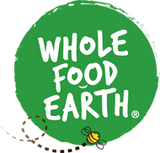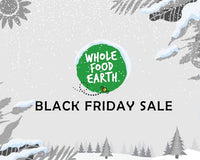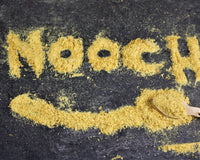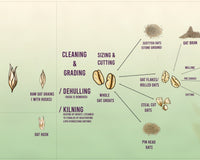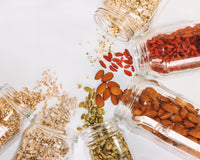In the world of wellness and health, there is a constant influx of new or improved superfoods. Every time one of these products appears, the whole of the health and wellness community tends to ask the age-old question; Will this work for me? And, Will this fulfil my dietary needs? In the case of Nutritional Yeast, the answer is a resounding YES, for most diets anyway. In this post, we’ll go through a few to ascertain whether or not it is.
Is Nutritional Yeast Vegan?
For all vegans out there, the answer is YES! nutritional yeast is, in fact, vegan.
However, there are some who remain dubious about the origin of the vitamin content in nutritional yeast. For those of you who might not know, there are two types of nutritional yeast, fortified and unfortified. Nutritional Yeast is typically fortified to contain vitamin B12. This vitamin is a micronutrient that is essential to keep nerve and blood cells healthy. However, it can only naturally be sourced from animals in the form of methylcobalamin.
In order for the fortified nutrition yeast to be vegan, a synthetic version of the B12 vitamin was created. This version of B12 is known as Cyanocobalamin. Low and behold, a way for vegans to receive their B12 requirement in their diets.
As a result, this has made it possible for vegans to consume fortified nutritional yeast, making it 100% passable per the vegan mandate.
Is Nutritional Yeast Suitable for a Keto Diet?
Nutritional Yeast is suitable for the Keto Diet.
The keto diet is named after a metabolic state in the body known as Ketosis. This happens when the body starts using fat as fuel instead of carbohydrates due to a reduction in the intake of sugar and carbohydrates.
Entering ketosis generally involves lessening carb ingestion to around 20-50 grams per day and replacing them with fats such as eggs, nuts, meat, fish, and healthy oils. Regulation of protein consumption is also necessary for a smooth transition into ketosis. Since ingesting high amounts of protein causes the body to convert it into glucose. The keto diet involves cutting out important food groups, making it difficult for those on keto diets to fulfil their basic fibre and nutrient needs. This is where nutritional yeast comes in to save the day.
Nutritional yeast is high in protein, contains all nine essential amino acids as well as, magnesium, copper, manganese and fibre. It can also be included as a way to add flavour or in replacing seasoning and cheese.
Nooch is more than suitable for those on a ketogenic diet. Just be sure to calculate and adjust your protein intake accordingly.
Is Nutritional Yeast Suitable for a Paleo Diet?
The answer is yes, no. Maybe? Let us explain.
The paleo diet is based on recreating a diet that resembles that of our hunter-gatherer ancestors’ diets from thousands of years ago. Even though it’s impossible to know precisely what our human ancestors ate in different parts of the world at the time, there is a general consensus that it contained whole foods.
A paleo diet can be quite flexible in the sense that there is no one right way to partake in it. As humans in the past, learned to thrive on what was available to them according to their location and current season. Some paleo eaters followed high carb diets eating a lot of plants, while others followed lower carb-based diets that incorporated more animal foods.
Now, where does nooch fall on this spectrum? Well, the simple answer is, it doesn’t. As nutritional yeast is a product derived from neither plant nor animal but rather a fungus, it falls into a bit of a grey area in a paleo diet. Nevertheless, this shouldn’t dissuade you from integrating this fun-guy (fungi) into your paleo diet. Seeing as it can be a suitable substitute for cheese and other seasonings, you could still enjoy the best of both worlds... sort of.
Is Nutritional Yeast Suitable for a Whole30 Diet?
The Whole30 Diet is a month-long (hence 30) clean eating plan. The program is described as being able to provide a ‘nutritional reset’ as opposed to other popular weight loss plans. It promotes self-awareness of the body and its different reactions to different foodstuffs. Think of the whole30 diet as a reset button of sorts. Reset your health, your eating habits, and your different relationships with food.
Rising to fame, the whole30 diet highlights the need to integrate whole foods. For anyone who lives with chronic illness, this diet can help you understand the way your body reacts to certain foods.
One of the key features of the whole30 diet is its restrictiveness. Holding fast to the program for a full 30 days can be quite challenging. Taking part in this plan will take some foresight and preparation. While participating in the whole30 diet, people will need to avoid legumes, grains, dairy, alcohol, added and artificial sugars, sulfites, MSG, and additives like carrageenan.
The addition of nutritional yeast to this specific diet shouldn’t be a problem. As nooch does not fall under any of the categories listed above, the addition of nutritional yeast to someone's whole30 diet may provide some tasty, cheesy relief.
Here Are Some Other Diets Nutritional Yeast May Fit Into
Is Nutritional Yeast Suitable for a Weight Watchers Diet? Yes.
Is Nutritional Yeast Suitable for a South Beach Diet? Yes.
Is Nutritional Yeast Suitable for a Raw food Diet? No. Note: it is not raw as it has to be pasteurised to kill the yeast. But it is a healthy, nutritious supplement.
Is Nutritional Yeast Suitable for a Mediterranean Diet? Yes.
Is Nutritional Yeast Suitable for a The Zone Diet? Yes.
Is Nutritional Yeast Suitable for a Vegetarian Diet? Yes.
Is Nutritional Yeast Suitable for a Pescteterian Diet? Yes.
Is Nutritional Yeast Suitable for a Juice Fasting Diet? Yes.
Is Nutritional Yeast Suitable for a Low-FODMAP Diet? Yes.

